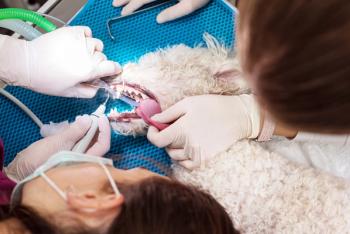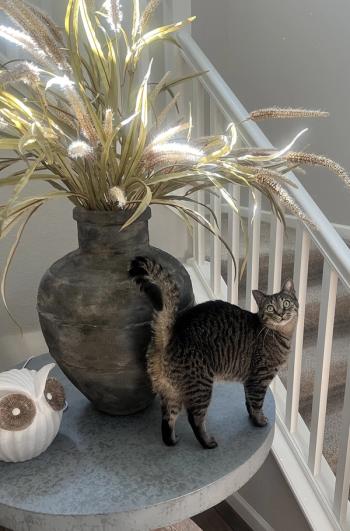
The Educated Client: Addressing the Fear - Noise Aversion and Your Pet
Although most animals don’t love loud noises, for a large subset of pets—nearly half, by some estimates—the sensitivity to sudden, loud noises is more than a dislike.
Does your dog or cat cower in the corner or hide in the bathtub on New Year’s Eve and the Fourth of July? How about during thunderstorms? Although most animals don’t love loud noises, for a large subset of pets—nearly half, by some estimates—the sensitivity to sudden, loud noises is more than a dislike. It reaches fear- and anxiety-inducing levels that can lead to behavioral and health challenges. This extreme reaction is called noise aversion.
The sounds associated with noise aversion share the common characteristics of being extremely loud, difficult to localize, and lacking in pattern—think fireworks, thunder, construction, and honking horns. Researchers do not know why some animals experience significant anxiety when they hear loud noises. Some pets may already suffer from anxiety disorders that are heightened by high-pitched noises, while others may develop the fear following a traumatic experience or learn the trait from another pet in the home. Regardless, it’s important for pet owners to recognize that their furry friend may be suffering and that noise aversion is a real medical condition that can be treated.
As with any illness or behavioral change you notice in your pet, noise aversion requires veterinary attention. Your veterinarian is the best source of knowledge and will be an invaluable resource for helping your pet find effective relief from this very real and potentially dangerous phobia.
You can institute a variety of remedies—both medical and environmental—to relieve your pet of the fretfulness that results from noise aversion. In many cases, it’s a combination of treatments that garners the best results.
First, it’s important to pinpoint the triggers of your pet’s fear, as not all animals respond to loud sounds in the same way. For instance, if you know fireworks cause extreme anxiety for your pet, you’ll want to have measures in place before holidays such as New Year’s Eve and Independence Day to help him get through the celebrations unscathed. Similarly, if storms cause your cat to hide in a closet or defecate outside the litterbox, but slamming doors barely makes her flinch, you can deduce that thunder is likely the trigger.
Don’t Scold
When your pet does something wrong, such as chewing your favorite slipper or scratching at the couch, your initial reaction may be to yell at or punish him. But when the destructive or negative behavior is correlated directly with fear and anxiety, consider that yelling could escalate the already negative situation. And then your pet will associate loud noises not only with fear but with punishment from you as well.
Don’t Force the Experience
At no point should you force your dog or cat to endure the noises that trigger anxiety—such as making her stay outside during a thunderstorm or go to the July 4th block party—to show her that there is nothing to fear. This will not work. Instead, doing so may make your pet even more fearful. And, to escape the situation, she may struggle and potentially injure herself or you.
Don’t Overreact
As much as you want to console your pet in his time of need, don’t overcompensate for his anxiety by fussing over him or becoming anxious yourself. Your pet may feed off your increased nervousness, and the situation will escalate.
Similarly, while it can be helpful for your pet to see that you’re in the room with him—your presence alone may provide a calming effect—hovering over him or sitting alongside him while he cowers in a corner may make him more anxious. Instead, stay in the room, but let your pet approach you as he sees fit.
Do Create a Safe Space
When faced with a loud noise that initiates your pet’s natural instincts to flee, many pet owners find it helpful to provide their cats and dogs with a confined space that they consider a haven, such as their crate or a closet. Outfit this area with familiar blankets and toys, and acclimate your pet to the location by feeding meals or treats there.
Do Provide Distractions
While your pet is experiencing an episode of anxiousness, you may want to offer treats to create a positive correlation with the noise—or, at the very least, offer a bit of distraction. If your pet’s instinct is to chew on furniture or exhibit some other destructive pattern, provide chew toys as an alternative. Also consider offering puzzle toys or a Kong filled with peanut butter to double up on the distractions and stress relief.
Do Consider Natural or Pharmaceutical Remedies
Depending on your pet’s signs and the level and frequency of anxiety, your veterinarian may recommend or prescribe medications and supplements designed specifically for their calming effects:
- Pheromone products. Available for both cats and dogs, synthetic pheromones are designed to decrease signs of stress, including shaking, aggression, and overall nervousness, that pets with noise aversion may exhibit. Although undetectable to the human nose, they replicate natural cat or dog pheromones and come in various forms, including sprays, diffusers, wipes, and collars.
- Compression vests. Available in a variety of sizes, these vests apply gentle, constant pressure—comparable to swaddling a baby—that produces a calming effect.
- Nutraceuticals. Anxitane (L-theanine; Virbac Animal Health) has been shown to provide effective relief for thunderstorm sensitivity. Additionally, supplements containing alphacasozepine, such as Zylkene (Vetoquinol), can provide effective relief for situational anxiety associated with thunderstorms and other events.
- Sileo. In 2016, the FDA approved the drug Sileo (Zoetis) for the treatment of noise aversion in dogs 16 weeks and older. The product comes as an oral gel that is administered between the dog’s cheek and gum and is designed to calm the pet without sedation, so the dog remains fully functional.
How Your Veterinarian Can Help
If you suspect your pet is suffering from noise aversion, be sure to consult with your veterinarian, even if you have already started to institute some of the nonmedical solutions. Left untreated, the chronic anxiety associated with noise aversion has the potential to cause health problems and shorten the lifespan of the affected animal.
Newsletter
From exam room tips to practice management insights, get trusted veterinary news delivered straight to your inbox—subscribe to dvm360.




